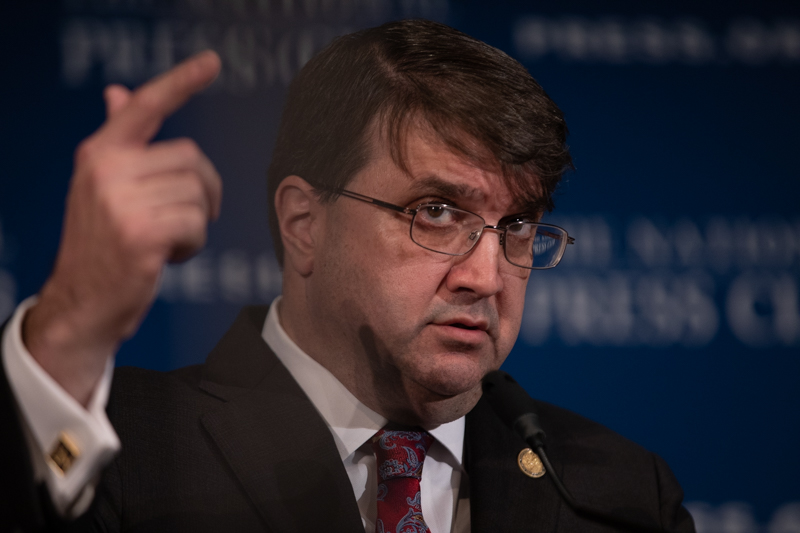VA Secretary Wilkie eyes further steps to address mental health

Veterans Affairs Secretary Robert Wilkie said the agency will develolp new ways to address veterans' mental health issues at a Nov. 8 National Press Club Headliners luncheon. Photos: Cheriss May
By next March, the Department of Veterans Affairs (VA) will develop a fresh approach to tackling the various mental health issues that have long posed a threat to former service members, Veterans Affairs Secretary Robert Wilkie told a National Press Club luncheon on Friday.
“I have asked us to take a deep dive into mental health, into addiction and into homelessness —that tragic continuum that leads to so many tragedies,” Wilkie said. “I am confident that we will have a new direction.”
Speaking from the Club dais just days before Veterans Day, Wilkie added that the current administration has brought the resources together to meet that challenge.
The secretary’s remarks came less than two months after the VA released a report concluding that 6,000 veterans died from suicide each year between 2008 and 2017, a development Wilkie described as “the saddest thing” his department has encountered.
Wilkie tied the latest data to both a historical trend of veterans committing suicide as well as national currents facing the U.S. at-large.
“We saw a massive ramp-up in suicides prior to the attack in Pearl Harbor, we saw a massive jump in the days after Vietnam, but this is a national problem,” Wilkie said. “Today, suicide is the number one cause of death for American youth.”
Wilkie noted that of the approximately 20 veterans who commit suicide each day, 60 percent have not had contact with the VA.
In the face of this crisis, Wilkie said that his department has been pursuing new ways to ensure that the VA is both accessible and useful to those who seek its assistance.
“The VA now has same-day mental health services. Every veteran who comes to us has a mental health screening,” Wilkie said. “Just in this last fiscal year, we've screened more than 1 million veterans for mental health issues. We follow 3,000 of those on a daily basis.”
Still, Wilkie described suicide among veterans as just one of the top two crises facing former soldiers. The other, he said, has been the nationwide opioid crisis.
To combat this, Wilkie cited attempts from the VA to find new ways to provide treatment, including substituting prescription opioids with a combination of “simple things like Tylenol and aspirin, ibuprofen, and aspirin” as well as embracing alternative therapies, including Tai Chi and yoga.
“We are setting the standard for offering our veterans a multitude of ways to address the pain that came as a result of their military service,” Wilkie said.
When pressed by former Club President Andrea Edney to disclose pilot mental health programs the VA is pursuing ahead of next spring’s announcement, Wilkie declined to give specifics beyond previously announced projects.
“I can't because they are being trotted out for competition,” Wilkie said.
Wilkie also responded to some of the other controversial elements facing the department, including the Mission Act, a new law that allows veterans to seek treatment in the private-sector over VA facilities in certain urgent circumstances.
Critics have charged the law as a step toward privatization, something Wilkie largely brushed off.
“If anybody accuses us of privatizing this system when we have a $220 billion budget, 400,000 employees, 172 hospitals and a patient satisfaction rate of 89.7%, only in Washington D.C. would people say that that is an argument that others are trying to prioritize an institution,” Wilkie argued.
